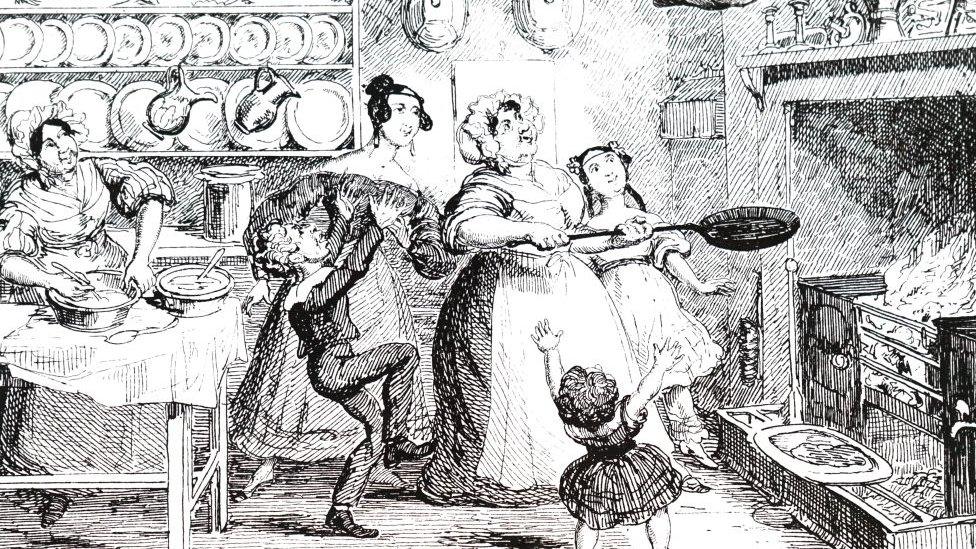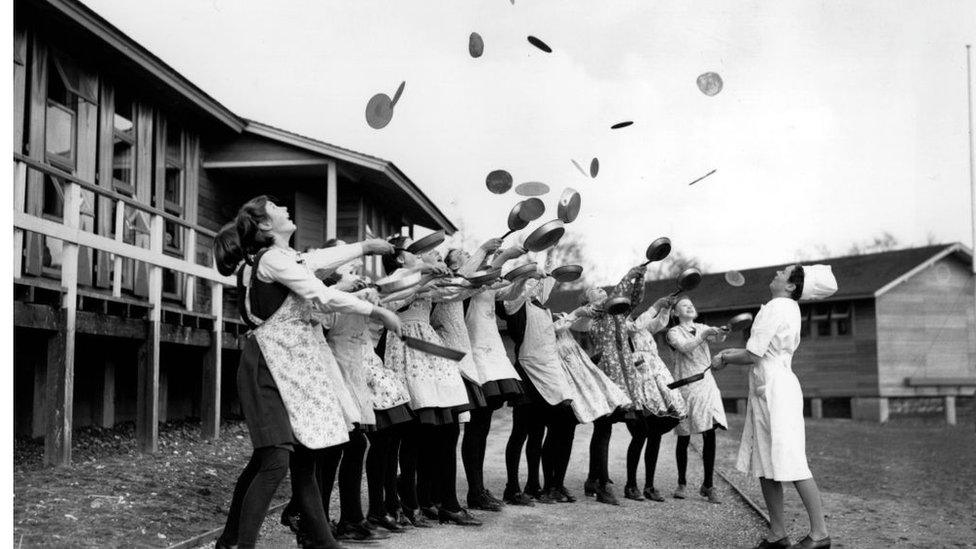Chalk Sunday: Women marked with an X for being single
- Published

An engraving depicting a woman tossing pancakes on Shrove Tuesday - the feast day before the start of Lent - dating from the 19th century
Today - the first Sunday in Lent - was once known as Chalk Sunday in Ireland.
"It was a custom dating back to the 1900s," said Fiona Byrne, curator of History at the Ulster Folk Museum.
"Young boys would have drawn Xs on the backs of single women's coats and dresses as they walked to and from Mass. They might have dusted them with chalk or touched them on the shoulder.
"It meant you didn't manage to get married and was a bit mean really.
"Who wants their single status advertised?"

February 1941: Celebrating Shrove Tuesday with a traditional pancake toss
Lent is an old English word meaning 'lengthen'. Lent is observed in spring, when the days begin to get longer. It allows Christians to remember Jesus's fasting in the desert. It is a time of giving things up and a test of self-discipline.
No sex
The old Irish tradition of Chalk Sunday ties in with the feast of Shrove or Pancake Tuesday -the last day before Lent began - when people celebrated and had weddings, in preparation for the period stretching over six weeks of fasting, penitence and denial.
Meat, eggs, dairy, alcohol and even sex were off limits for strict Catholics in Ireland over Lent. Music and merrymaking was not enjoyed. There was a tradition of musical instruments being put away for the six weeks of Lent.
"Shrove Tuesday was traditionally the last day to get married before Lent," said Ms Byrne. "There would have been a big rush for priests running up to Shrove Tuesday."
People who were single were considered to have disregarded their social duty to marry and enjoyed a lesser social status.
It followed that Chalk Sunday was a focus on the single.
"Women's role at that time was about getting married, having children and keeping a house," said Ms Byrne.
"Women did so much more than that … but as for marriage, for some women it just may not have worked out. The word 'spinster' is a horrible term."
The tradition of Chalk Sunday was not popular in Ulster. It was more common in the south western part of Ireland in the early part of the last century, she said.
There might have been public jeering and cat calls as well.
Skellig Night was a feature of Shrove Tuesday in parts of the Republic of Ireland, especially Cork and Kerry.
After sunset, noisy crowds went onto the streets of towns mocking the people who were single and telling them to "go to the Skelligs".
The Skellig islands off County Kerry were said to still run under the old calendar, therefore Ash Wednesday would arrive later there, so that there would be still time for the single to go there to marry before Lent began.
Sometimes, people in disguise would call to the homes of the single and try to take them out onto the streets.
'Pus Sunday'
The word "pus" is Irish for scowl and the day was also called Pus Sunday - as those who were without a partner were said to wear a scowl reflecting their unhappiness at being single.
The day after Chalk Sunday was Salt Monday.
"Salt Monday was a day when girls who did not manage to get married would have salt thrown at them to 'preserve' them until Lent was over," said Ms Byrne.
"It was saying that they would be kept still 'ripe'. But this was a bit more light hearted rather than an X on your back as you were walking home from Mass."
Salt Monday targeted women, she pointed out.
"It's a hint at women's fertile cycles. There was no need to preserve men as there's not a clock on them."
She said that with the modern eye, looking back, it sounds "mean".
Related topics
- Published22 February 2023

- Published12 February 2024
